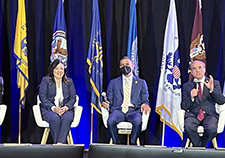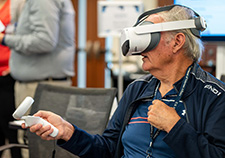Office of Research & Development |
 |


Private Fred L. Greenleaf crosses a deep irrigation canal during an allied operation during the Vietnam War. (Photo: National Archives)
June 13, 2018
By Tristan Horrom
VA Research Communications
"These findings support the importance of [VA care] for conditions possibly related to military service."
For Vietnam Veterans, having a medical condition presumed related to Agent Orange exposure is linked to greater use of Veterans Affairs health care.
That is the main finding of a study by researchers with the War Related Illness and Injury Study Center (WRIISC) at the VA New Jersey Healthcare System. They say the results show that a law passed by Congress nearly 30 years ago has largely met its goal: helping affected Veterans get the care they need.
The study results appeared in May 2018 in the journal Medicine.
Agent Orange is a chemical defoliant that was sprayed by the U.S. during the Vietnam War to kill plants and clear land. It was contaminated with dioxin, which is known to cause cancer and other conditions. Twenty million gallons of Agent Orange were sprayed during the Vietnam War. About 2.7 million U.S. military personnel may have been exposed.
Veterans are eligible for compensation from the Veterans Benefits Administration if they have a service-connected disability. The higher the disability rating, the more compensation they are due. Veterans with higher service-connected disability ratings also have greater access to no-cost health care through the Veterans Health Administration. However, it is often difficult to prove direct service connection for Agent Orange-related conditions because they may develop years after exposure.
To address this problem, Congress passed the Agent Orange Act of 1991. The act directed VA to presume service-connected disability for conditions the National Academy of Sciences deemed related to Agent Orange. Veterans with these conditions qualify if they were in Vietnam between Jan. 9, 1962, and May 7, 1975.

VA opens new research center to seek novel arthritis treatments

Under Secretary of Health, panel of experts discusses PACT Act impacts for Veterans

Virtual reality technology helps Veterans in pain

Veteran disability payments led to fewer hospitalizations
Seven non-cancer conditions have been designated as presumptively service-connected for Vietnam Veterans: chloracne (a severe acne-like skin condition), ischemic heart disease, Parkinson's disease, peripheral neuropathy, porphyria curtanea tarda (a skin condition that causes blisters, hair growth, and discoloration), AL amyloidosis (an immune-system disorder that can damage the organs), and Type 2 diabetes. Several forms of cancer are also included: chronic b-cell leukemias, Hodgkin's disease, multiple myeloma, non-Hodgkin's lymphoma, prostate cancer, respiratory cancers, and soft-tissue sarcoma.
To find out how this policy affected VA health care use, the researchers looked at 2013 data on 85,699 Vietnam Veterans. They found that those with one or more diagnoses of a presumptive condition were more likely to have multiple disabilities than those without one of the named conditions. While they were less likely to have a 100 percent disability rating than those with no presumptive condition, they were more likely to have Individual Unemployability. This means they cannot maintain employment because of service-connected disability.
Of those with any presumptive condition, 73 percent had Type 2 diabetes. About 44 percent had ischemic heart disease, and 16 percent had some form of cancer.
Looking at health care usage, the researchers found that 35 percent of those with a presumptive condition had five or more primary care visits in fiscal year 2013. Only about 15 percent of those without a presumptive condition had this many visits.
Forty-five percent of the presumptive condition group had five or more specialty care visits, compared with 15 percent of those without presumptive conditions. Of the presumptive-condition patients, 37 percent had at least one mental health visit, compared with 16 percent for those without any of the conditions.
In other terms, those with presumptive conditions were more than twice as likely as those without the conditions to be frequent users of primary and specialty care in the VA health care system. They were also more likely to visit emergency rooms than the other group.
The study shows that Agent Orange legislation has been effective, write the researchers, at lowering "the threshold for accessing [Veterans Benefits Administration] and [Veterans Health Administration] benefits for Vietnam Veterans who may have been exposed to dioxin." The findings highlight the importance of presumptive service connection in serving Veterans, they conclude. The results may also indicate that Vietnam Veterans with these service-connected conditions are more likely than those without these conditions to choose VA for their care.
Dr. Dennis Fried, corresponding author on the paper, summed up the importance of the results: "In our era of increased Veteran choice with regard to health care delivery sites and greater integration of VHA and community care, these findings support the importance of VHA provision of services for conditions possibly related to military service."
For more information on Agent Orange exposure, visit VA's Agent Orange website. To learn more about VA research concerning Vietnam Veterans, visit www.research.va.gov/topics/vietnam.cfm.
VA Research Currents archives || Sign up for VA Research updates